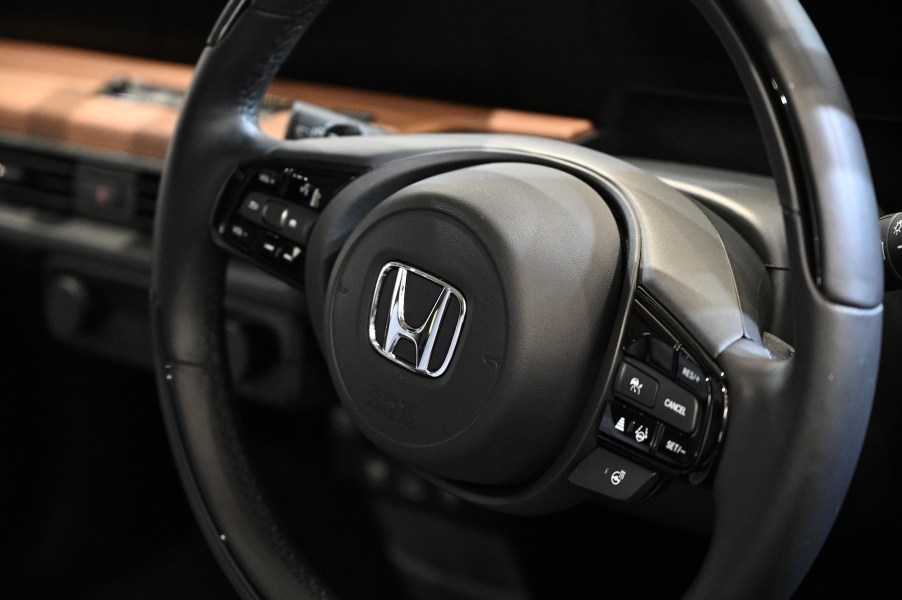
Honda Doesn’t Think You Should Sue It Over These Safety Issues
Honda might believe that the technology in the Honda Sensing suite of safety features in its new vehicles is great and that it will ultimately lead to a collision-free future. But some 2017 Honda CR-Vs owners aren’t convinced.
When the automaker allegedly failed to fix issues drivers encountered with the emergency braking system, they filed a class-action lawsuit. But so far, the owners’ claims haven’t impressed the company.
The Honda Sensing safety suite
Honda has a reputation for embracing technology and using it to improve its vehicles. The addition of Honda Sensing in recent models is a perfect example of the automaker’s willingness to employ available technology.
The idea behind Honda Sensing is to use technology to help drivers avoid collisions.
“Honda Sensing is our exclusive intelligent suite of safety and driver-assistive technologies designed to alert you to things you might miss while driving,” the Honda website states.
Honda has shown it’s committed to creating a collision-free society. The manufacturer even created a timeline. And the goal is to be collision-free by 2040.
“People, vehicles, and infrastructure will be connected like never before through an omni-directional safety system,” Honda said in a “Power of Dreams” statement. “New technologies will emerge that will reduce driver workload and enable a 50% reduction in crashes involving … 2020 Honda vehicles.”
The Honda Sensing safety suite includes road departure mitigation, braking assist mitigation, blind-spot warning, lane assist, and adaptive cruise control. It also boasts traffic sign recognition, cross-traffic monitor, lane watch, and automatic high-beams. Most 2020 and 2021 vehicles come equipped with the safety suite. The program looks good, and many are excited about it.
But the best-laid plans sometimes go awry. That’s what drivers of vehicles with an early version of Honda Sensing say they discovered the hard way.
Honda Sensing problems have upset drivers
Some 2016-2019 CR-V owners aren’t happy with the early version of Honda Sensing that came with their new vehicles. Common complaints with the safety system: The adaptive cruise control didn’t work properly, the weather could cause the sensors to alert suddenly, and the steering wheel sometimes had difficulty figuring out the neutral position. But the biggest complaint involved the emergency braking mitigation. According to drivers, their vehicles would suddenly brake when there was nothing in front of them.
Car Complaints reported on one driver’s experiences with Honda Sensing in her 2019 Honda CR-V EX. The fact that alarms suddenly sounded and her vehicle braked for no apparent reason upset her. She took the CR-V to an authorized mechanic to address the issues. The mechanic was unable to duplicate the problems she had encountered. So the only thing the shop could do was clean the sensors and return the CR-V to her.
As similar complaints arose and the automaker failed to take action, some affected owners filed a class-action lawsuit against the manufacturer. According to Top Class Actions, 2017 Honda CR-Vs drivers are involved in the lawsuit.
The automaker’s response to the lawsuit
Honda took a proactive stance against the class-action lawsuit. The company has filed a motion to dismiss it.
“Plaintiffs allege the Honda Sensing system is defective because it is not perfect …,” Honda wrote in its motion to dismiss the case, according to Top Class Actions. “In the context of alleged automobile safety defects, it is not enough for a plaintiff to simply allege that a problem may exist and that a defendant should have disclosed something about it somehow, or just made the automobile better.”
The federal judge overseeing the case hasn’t yet issued a formal response to the automaker’s motion to dismiss the lawsuit. If the judge refuses the automaker’s request and the plaintiffs win the case, the outcome could set an interesting precedent: Plaintiffs could successfully sue companies for potential accidents instead of actual incidents in which someone was seriously hurt or killed.
If this lawsuit has made you second-guess your desire to own a Honda, rest assured. Data from the Insurance Institute for Highway Safety and the Highway Loss Data Institute indicates the automaker’s technology has reduced claim rates for damage to other vehicles and property by 11 percent and claim rates for injuries to people in other vehicles by 28 percent, BestRide.com reported.


